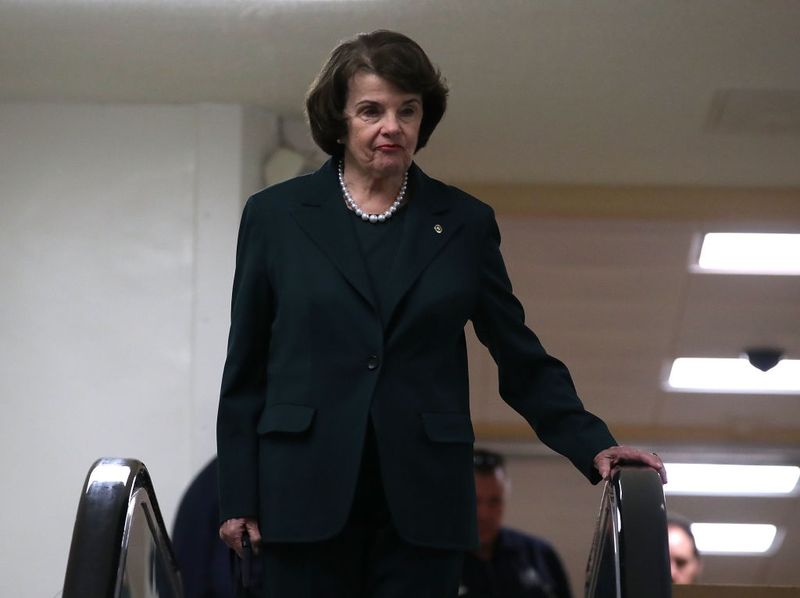Senator Dianne Feinstein owes a public apology to judicial nominee Amy Coney Barrett, as during Barrett’s confirmation hearings last week before the Senate Judiciary Committee, Feinstein, the California Democrat, insinuated an anti-Catholic stereotype that goes back at least 150 years in the US — that Catholics are unable to separate church and state.
If a Catholic senator had asked a Jewish nominee whether she would put Israel before the U.S., or if a white senator had asked a black nominee if she could be an objective judge given her background, liberals would be screaming bloody murder. Feinstein’s line of questioning, which was taken up by other committee Democrats, is no less an expression of prejudice.
The thrust of Feinstein’s questioning was that, as a believing Catholic, Barrett couldn’t be trusted to apply the Constitution and laws objectively should she be confirmed to the 7th Circuit Court of Appeals. Feinstein repeatedly used a term with a long history as a dog whistle for anti-Catholicism in America: dogma. “The dogma lives loudly within you,” Feinstein asserted. She went on: “Dogma and law are two different things. I think whatever a religion is, it has its own dogma. The law is totally different.”
And the senator topped it off with a classic form of bias: the irrefutable imputation. “Why is it that so many of us on this side have this very uncomfortable feeling?” she asked.
The word “dogma” that Feinstein deployed is specifically connected to the Protestant critique of Catholicism, and to its particularly nasty American version. A dogma is an article of faith laid down by an authority. One of the classic Protestant polemical attacks on Catholicism was the allegation that Catholics are obligated to believe what the church teaches them is incontrovertibly true, whereas Protestants are called on to form their own beliefs on the basis of individual faith and judgment.
Starting in the 1840s when Irish Catholic immigration to the U.S. increased sharply as a result of the Great Famine, American Protestants began to transpose this religious dispute into the realm of politics. Nativists argued that Catholics couldn’t be good citizens of a republic because they wouldn’t be able to form individual judgments about politics.
The shorthand version of this view asserted bluntly that Catholicism and democracy were incompatible — an argument that prefigures the contemporary view that Islam and democracy cannot coexist. Like the modern canard, this claim was supported by the observation that European democracy had begun in Protestant countries and, in the 19th century, had not yet spread to Catholic ones.
The low point of the bias came in 1876, when the Senate debated a proposed constitutional amendment that would have barred states from funding “sectarian” — i.e. Catholic — institutions. The amendment had been drummed up to create anti-Catholic bias in the upcoming presidential election. In the course of the debate, Republicans (then the anti-Catholic party) bashed the Catholic Church for opposing liberty of conscience, hinting that good Catholics could not be good Americans.
Sometimes the claim that Catholics couldn’t be good citizens was supplemented with the assertion that Catholics owed their allegiance to the pope, not to the Constitution. That argument was used effectively against Alfred E. Smith when he ran for president in 1928. It was tried again, albeit less successfully, against John F. Kennedy in 1960.
To be charitable, it’s entirely possible that Feinstein doesn’t know the details of this history of bias. But her suggestion that a Catholic would favor “dogma” over the Constitution comes directly out of that history. And ignorance is no excuse. When public figures try to excuse the invocation of anti-Semitic or racist stereotypes by saying they didn’t understand the implications, we tend not to be very forgiving.
Nor can Feinstein’s line of questioning be defended on the ground that Barrett once co-authored an article in which she suggested that, if a Catholic judge truly felt unable to reconcile her religious belief with the law, it might be proper for the judge to recuse herself from the case. The point of the article was that religious faith could not and must not trump constitutional faith. In other words, Barrett rejects the idea that religious dogma should affect legal judgment. In this she follows rather precisely the viewpoint of Justice Antonin Scalia, for whom she clerked. 1
What’s going on here politically is that Feinstein and other Democrats want to imply that the presence of Catholic justices is a threat to the landmark abortion decision Roe v. Wade. And they want to taint Barrett’s nomination so that she won’t be considered a potential Supreme Court pick in the future, as she likely would be if her appeals court nomination sailed through.
As a sociological matter, it’s of course fair to notice that the Supreme Court has five Catholics on it. And it’s fascinating to observe that Catholic intellectuals have become the vanguard of legal conservatism in recent decades.
But religious affiliation isn’t judicial destiny. Justice Anthony Kennedy, a Catholic, cast historic votes to preserve the abortion right in in 1992 in Planned Parenthood v. Casey and again in 2016 in Whole Women’s Health v. Hellerstedt. Another Catholic, Justice Sonia Sotomayor, is the court’s most liberal member and a firm supporter of abortion rights. Justice William O. Brennan, one of the greatest liberal justices ever and a key actor in the development of abortion rights, was Catholic.
The solution here is for Feinstein to do what other public officials have done when they’ve expressed bias: She should acknowledge that her questions resonated with historic anti-Catholicism, retract them and apologize.
Bloomberg
